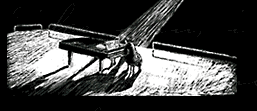The sensory world of sound imagined and then brought to lush life
by the Douglas Fir has precious little to do with the Boston band's
immediate environment. The Fir's pulsing, vividly focused art-house
view of the universe came out of a cramped Allston basement. But
the core members of the five-year-old band - singer-guitarist Jay
Walsh and bass player Patrick Cooley - have a distinctly European
pop sensibility. With a richly layered, swooningly atmospheric approach,
they make music that has the chiming grandeur and air of mystery
that surround highly literate, lyrically romantic bands such as
the Church (Australia), the Smiths (U.K.), Aztec Camera, and the
Go-Betweens (Australia).
``I grew up listening to some of those bands, but I also grew up
listening to Husker Du and the Replacements,'' says Walsh over drinks
and appetizers with Cooley at a Cambridge restaurant. He supposes
some of those overseas comparisons have to do with his Anglophilic
vocal affectations (in song, the Miami-born Walsh pronounces ``last''
as ``lahst'') and the shimmering sustain and enveloping tones he
coaxes from his electric guitar. Meanwhile, the moody, overcast
rumble of Cooley's bass betrays an adolescence spent learning the
instrument by playing along to Cure albums. The other UK-ish elements,
the duo insist, are pure happenstance - magic that Walsh says ``comes
out of the walls. We never sit down and say `Let's sound like this
because no one sounds like this in Boston.' But we do feel a little
bit out of place here sometimes.''
Even the cover of the Fir's debut album, ``When This Wears Off''
(out Tuesday on the band's own Dark Years Records label and available
at www.darkyears.com), speaks to the band's fondness for all things
English: striking sepia-toned photographs of steepled city rooftops,
Dickensian lampposts, and doorways dripping with ivy. ``People think
it's England,'' says Walsh, who took the photos. ``But actually,
it was all shot in Beacon Hill.'' In Boston, where old-school garage-rock
and power-pop tend to dominate, the Douglas Fir's melancholic surrealism
is an anachronism that catches the eye as well as the ear.
``I kind of like it that way,'' says Walsh, who pens the band's
elegiac, often evasive lyrics and anoints them with such Morrissey-esque
song titles as ``The Arsoniste'' and ``I Think I Loathe You.'' ``I
like the fact that we have one foot in the local scene here and
one foot out. And even with what's going on nationally, I don't
mind feeling a bit out of time and out of date. God knows I don't
know half the stuff that's on the radio.''
Still, Cooley points out, after a few ``ugly'' years of rock radio
dominated by rap-metal and generic prom-rockers, he's finally seeing
moody, UK-influenced bands such as Interpol (from New York City)
and Black Rebel Motorcycle Club (San Francisco) making headway on
the airwaves. The implication, of course, is that there may be hope
yet for an outfit with a thirst for lavishly melancholic pop.
Go to Boston.com to hear audio samples of the Douglas Fir songs
``The Arsoniste'' and ``I Think I Loathe You.''
Ever since the group began releasing a painstakingly produced series
of limited-issue color vinyl singles (in 45 r.p.m. format, no less)
- tucking each in sleeve very nearly as arresting as the songs -
the Fir has, in fact, been making some headway of its own. In 2000,
it won a Boston Phoenix annual readers' music poll as best new act.
The band has been singled out for praise in the pages of taste-making
music mags including CMJ and Magnet and has opened a slew of high-profile
shows around town.
Now, with a CD-release party slated for Jan. 24 at the Lizard Lounge,
it's the Fir's turn in the spotlight. It'll be joined on the bill
by the Mittens and local faves Francine, whose guitarist, Albert
Gualtieri, regularly sits in with the Fir during live shows. (Walsh,
who's also something of a graphic designer, was art director for
the cover of Francine's latest album, as well as a pair of albums
by British singer-songwriter Richard Thompson.) Drummer Pete Caldes
of the bands Gravel Pit and the Gentlemen will also be on hand,
manning the drum kit for the band's performances as he's done since
the departure last year of original Fir drummer John Michael.Cooley
and Walsh say they're excited, and relieved, to finally have their
CD on the cusp of release. Initially the two had shopped the album
around to a handful of record labels in hopes of signing with a
company that had the resources to get their music to as many ears
as possible.
After receiving a number of encouraging responses but no firm commitments,
they decided they had waited long enough. ``My first response is
`It's about time,''' Cooley says - it took the group a while to
cobble together the funds to record ``When This Wears Off.'' ``But
we did what we could with the time and budget we had.'' As if to
make up for lost time, the duo has already written roughly a dozen
new songs for another album, which they'd like to release inside
of a year.
Ian Kennedy, who coproduced ``When This Wears Off'' with Walsh and
leads his own Boston alt-rock outfit, Reverse, says he was struck
by the Fir's distinctive sonic perspective the first time he heard
the group.
``It was refreshing because I thought they were obviously in a world
of their own,'' says Kennedy. ``They definitely weren't plugged
into any scene [that dictated] `This is how you sound, this is how
you look, this is what you do.' They were definitely off in their
own area code, and I always love hearing bands like that. Nobody's
doing what they're doing.''
Walsh and Cooley don't like thinking about niches. ``The moment
you start worrying about fitting somebody else's idea, you're going
to go crazy,'' says Walsh. ``If you make a record that the record
company wants and it bombs, then you're going to think `Why did
we do that?' When we're writing, [fitting a niche] doesn't even
enter into it. The moment it does, you become less of yourself.''



